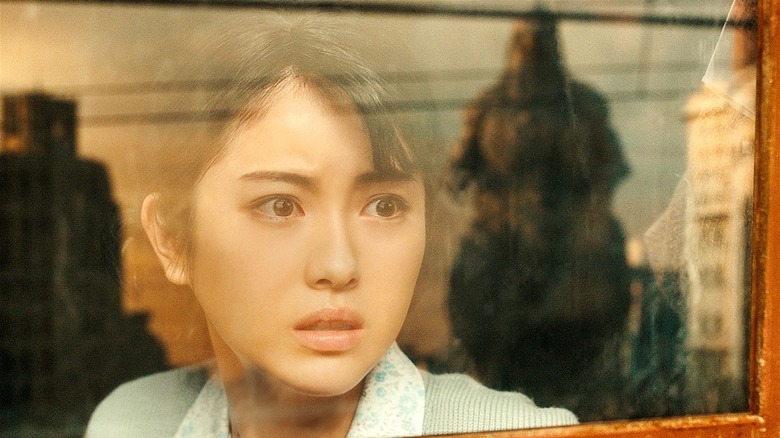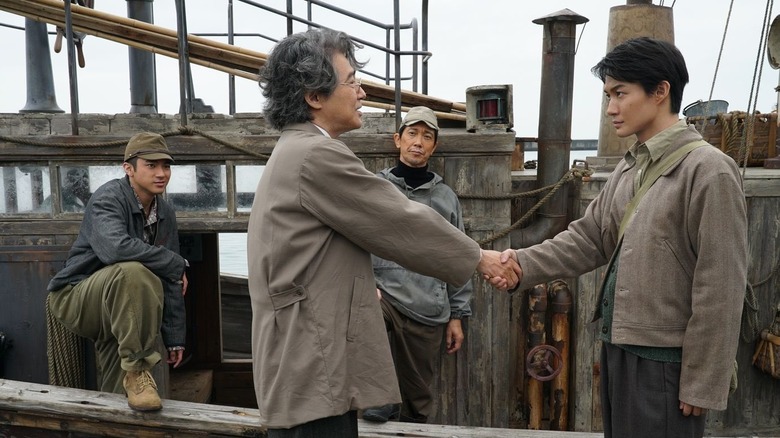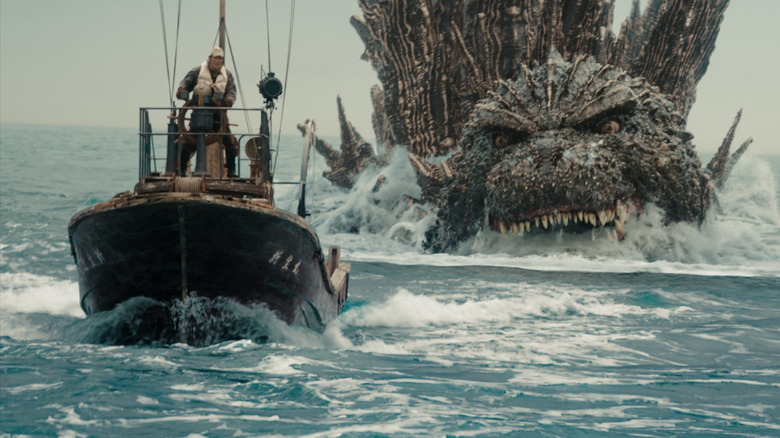Godzilla Minus One Review: The Blockbuster We Needed
- Makes Godzilla scary again
- A compelling and inspiring human story
- Great effects for the budget
- Less ambitious than "Shin Godzilla"
- Politics might be controversial
Maybe it's because of the strike-related delays, but this fall movie season has so far lacked a true standout blockbuster. In general, the arthouse films and Oscar bait have been strong and the few big mainstream releases have generally been ... fine. Okay. Mediocre at worst, pretty good at best, but little to get super excited over. "The Marvels"? It's fine. "Hunger Games: The Ballad of Songbirds and Snakes"? It's fine. "Napoleon," "Wish," "Trolls Band Together"? Haven't seen them, but I'm not super interested based on the general reception. The big Thanksgiving releases have mostly been hovering in the 50s and 60s on Rotten Tomatoes and Metacritic, some attracting more appreciation or disappointment than others, but there's not a single "Barbenheimer" among them.
To the rescue comes "Godzilla Minus One," the exact sort of scary, inspiring, super entertaining large-scale popcorn movie we've been missing this season. If Americans are willing to read subtitles in the movie theater, this should be a massive hit. The first live-action Japanese "Godzilla" film in seven years since 2016's "Shin Godzilla," it easily clears the American "MonsterVerse" movies. Written and directed by Takashi Yamazaki, whose resume is equally split between World War II dramas and popular anime franchises, "Minus One" returns the King of the Monsters to Ishirō Honda's original intention, representing the horrors of war and the atomic bomb. And unlike in a lot of weaker kaiju films, the human elements work just as well as the monster scenes.
An interesting protagonist anchors the action
The main character this time around is Kōichi Shikishima (Ryunosuke Kamiki), a pilot who backs out of a deadly kamikaze mission in the final days of World War II, hiding on an island repair station under the fake excuse of a faulty plane. He wants to live but has nonetheless internalized the belief he's a coward for doing so — a survivor's guilt that only grows after barely surviving a rampage by a pre-nuclear Godzilla.
When Kōichi returns home to Tokyo after the war, everything is in shambles. Japan is at its lowest point — and then a few years later, America's bomb tests in the Bikini Atoll turn Godzilla nuclear, resulting in the title's threat of Japan going from "zero" to "minus one." America refuses to do anything about the monster due to Cold War tensions with the USSR, and Japan doesn't have its own military anymore for obvious reasons, so the mission of neutralizing the threat goes to a ragtag team of civilians, mostly veterans seeking some form of purpose. Though Kōichi has formed a makeshift family with a kind woman (Minami Hamabe) and a war orphan child, he's nonetheless preparing to lay down the life he feels he doesn't deserve in order to defeat Godzilla.
Much of the action in the film is set at sea, and the rapport between the characters positively evokes the original "Jaws." The nautical sequences showcase the film's strongest action and visual effects work. Godzilla himself is well-designed as an imposing force of seemingly unstoppable destruction. The kaiju is sometimes subject to inconsistent CG-rendering quality, but perfect special effects have never been this franchise's forte. Considering the budget for this was only $15 million – a tiny fraction of the American "Godzilla" movies' budgets — this is some impressive work.
How does Minus One compare with Shin Godzilla?
Takashi Yamazaki's approach to "Godzilla Minus One" is similar to Hideaki Anno and Shinji Higuchi's approach to "Shin Godzilla" in terms of treating Godzilla as a source of horror akin to the original 1954 film. In most other ways, however, the two most recent Japanese "Godzilla" films are wildly different. Anno and Higuchi's masterstroke was to translate the horror of the concept to the present day and to counterbalance it with hyper-stylized satire, using the Fukushima disaster as a blueprint for how the modern Japanese government would deal with a kaiju attack. As a period piece covering more well-trod ground, "Minus One" doesn't have the same creative vitality but makes up for that with strong execution. It's "Godzilla" as a "dad movie," more or less, but it's a damn good one.
How the film covers its period setting will surely inspire discussion — one I'm perhaps not best equipped to actively partake in but sure am interested in listening to. Certainly, anyone who criticized "Oppenheimer" for not showing Japanese perspectives on the bombings owes it to themselves to see this movie, which is all about post-war Japanese civilian points of view. The film's relationship with nationalism and militarism feels complicated: the Japanese imperial government is strongly condemned for its devaluing of human life, but the imperial army's soldiers nonetheless get a chance at redemption by reapplying their skills to more positive ends.
Yamazaki's historical films have caused controversy in the past, and I'm not enough of an expert on the current Japanese political situation to say how "Godzilla Minus One" will play politically. What I can say is that this story of optimistic redemption against impossible odds plays super effectively on the levels of drama and entertainment. At the press screening I attended, the audience was screaming in the film's darkest moments and cheering at the most victorious ones — and keep in mind, this was a press screening for critics. This is gonna be a crowdpleaser.
"Godzilla Minus One" opens in American theaters on December 1, with preview screenings on November 29.


